A note from the Editor, Maddy Butcher:
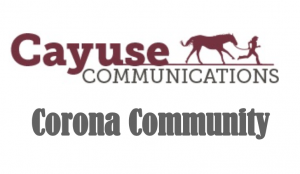 Here at Cayuse Communications, we’ve been thinking about our community of horse owners and riders. How best to come together and share during this time? We’ve reached out to friends to see how they are making lemonade from lemons and coping with the strains of the pandemic.
Here at Cayuse Communications, we’ve been thinking about our community of horse owners and riders. How best to come together and share during this time? We’ve reached out to friends to see how they are making lemonade from lemons and coping with the strains of the pandemic.
Introducing the Cayuse Corona Community, a new recurring feature. We’re from California, New Mexico, Maine, Utah, North Carolina, Ohio, Kentucky, Indiana, Virginia, and Colorado. Please join us by leaving your comments below. We’ll get through this and it’ll be better if we’re together.
Concurrent with these Cayuse Corona Community pages, we will be offering weekly giveaways, including goods from Redmond Equine, Kershaw knives, and the Cayuse Communications library of books. Read more about that here.
Cayuse Corona Community:
Jec Ballou is a popular BHPS presenter and busy clinician based in California. Ballou is the author of several horsemanship volumes, including Equine Fitness, 101 Western Dressage Exercises, and 101 Dressage Exercises. She lives in the Bay Area, south of San Francisco.
I reached her at her barn:
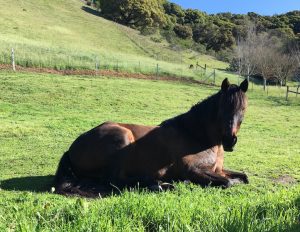
Corazon, Jec Ballou’s horse, greets her on a sunny California morning
I am standing outside on a sunny, windy day, waiting for a long-time student of mine to drop off her Rocky Mountain horse for a few weeks of training.
The weirdest part of my new normal is probably, when I get to the barn every morning, grabbing the bottle of 409 and spraying every knob and gate and latch and chain that my hands are going to touch. It’s a barn for godsakes (laughing). It just feels really odd and maybe too neurotic. I don’t know.
Things that cause me angst are that it’s really hard to get any sense of timeline or planning. and I’m a goal-oriented person and my training likes to have goals and it’s hard to know where we’re headed.
Things that bring me a smile: all the horses. I find I have more time to spend, to slow down, and be mindful with the horses. I find myself really enjoying their individual quirks and personalities. Very grateful for that.
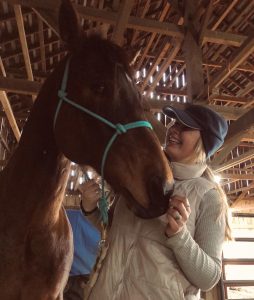
Emily and her horse, Kip
Emily Dent is a Best Horse Practices Summit volunteer who works at the Central Kentucky Riding for Hope facility, a therapeutic riding center in Lexington, Kentucky, and site of our 2020 BHP Summit.
Normally, this time of the week I would be standing in the middle of our arena explaining to a horseback child and his team of helpers how to hold his reins and steer his horse. He’d be bouncing in his saddle and I would redirect his energy by incorporating a bouncy trot into the lesson. Our volunteers would be gently holding the child’s ankle or thigh in place and may be loaning a hand to aid in steering.
This week, however, I’m shedding horses and mucking out paddocks. There is no child in sight, no volunteer available to give a helping hand.
In December, my housemate and best friend received a heart transplant. Though her quality of life has greatly increased since the procedure, she has become acutely aware of the risk her new heart faces in times of a pandemic. In order for her body to continue accepting a heart from another body, she takes pills that weaken her immune system, making them less successful at fighting foreign bodies like a new heart or the Coronavirus.
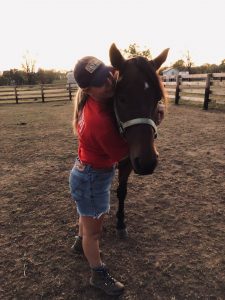
Emily and Kip
Because I am still going to work everyday and caring for our herd of 28 horses, along with our other essential equine staff, I cannot live in my home with my best friend. So instead of cooking dinner in the familiarity of my kitchen and cuddling up with my cat every night, I am sleeping in the spare room of my coworkers.
COVID-19 has displaced me into a realm of uncertainty. I don’t know when I can go back to my house or what will happen and where I will go if I catch the virus. I don’t know how a therapeutic riding center can continue with its mission in a time of quarantine and social distancing. The list of things I don’t know is growing much longer than the list of things I know.
But, I do know that I am grateful to work with such a compassionate staff who have brought me into their homes and asked for nothing in return. I’m thankful to have my horse of over a decade at a small barn where I can still see him without the risk of infecting others. I’m thankful that equine care is essential work and I do not need to worry about money right now.
We all know riding is therapeutic—this is why I have been able to spend five days a week instructing people with disabilities. Whether they need a warm hug from their equine partner while grooming or sensory input from a trot to keep them engaged in the task they set out to complete, every aspect of barn life is healing.
Everyday, I muck up manure and old hay. I leave work to visit my own horse, to scrape away mud and and lose hair from his shedding coat. His ears will perk up when he hears me unwrapping peppermint and I’ll let his warm breath and whiskers tickle my hand. I might miss my home and my cat and hugging the people I love, but I am sane because everyday there are horses that need to be taken care of.
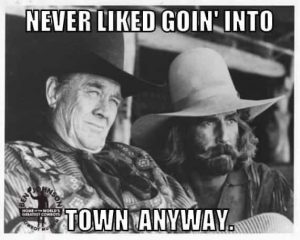
A pandemic meme, sent from Kyla Strange
Maddy Butcher, BHPS director and Cayuse Communications publisher, writes of oranges, lemons, horses, and dogs. Read her essay here.
Steve Peters is a BHPS steering committee member and popular Summit presenter. He works at two Intermountain Hospitals in Utah where he is a neuropsychologist. He is the co-author of Evidence-Based Horsemanship and collaborates with Maddy Butcher on HorseHead, a blog about brain science.
I reached him at his office in American Fork, Utah:
Working in the hospital, never a day that goes by where I am not fully aware of the impact of the COVID-19 virus. Each day brings new and more stringent precautions. Now everyone, including security, physicians, nurses, patients, and administrators have their temperatures taken as they enter and leave. It’s a little unnerving even if you are feeling fine.
I’m now testing patients via telemedicine while they stay home and the disconnect feels strange.
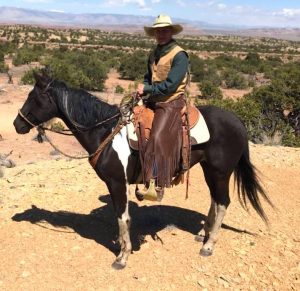
But once I am headed to my own home, it’s out of the lab coat and into boots and jeans. I let the screen door go whoosh bang as I head to the ranch and my horses. They may have little sense what a big role they have played in helping me stay sane. Even shoveling poop is a grounding, beautiful, mindful experience that removes me from a masked, gloved, and gowned world.
Putting spring rides on all my horses was a great reconnect with the normal, warm, organic, safe world that existed a few months ago. But how there is a real sense of being grateful and appreciative.
Debbie Hight is a BHPS board member, horse owner, and occasional guest columnist for Cayuse Communications. She writes from her home in Maine, where she is caring for barnyard and, most recently, her 10 year-old grandson, too.
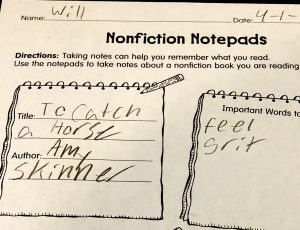
Notes from William’s schooling. He’s reading Amy Skinner’s book, “To Catch A Horse.”
This week, things are better here. Life was tough last week as my 10-year old grandson and I adjusted to homeschooling. Thankfully, we are in a better routine this week, though the school day lasts until 1 pm, and then there is another hour later in the day.
Our salvation has been the horses. William’s confidence is gaining. He will put Roxy into a walk and stretch his arms, legs, and back without holding on. He finally “dared” to try cantering yesterday. In true Roxy fashion, my mare didn’t have a clue what he was talking about or cueing. So I got on and she seemed to remember, then William did it! The look of pure joy on his face was worth every academic struggle. He has had me take Postcard Jack up to the arena each day when he rides as well. He hates it when we “leave” him behind. By the way, Jack turned 30 on Saturday. Read more about the celebrated Postcard Jack here.
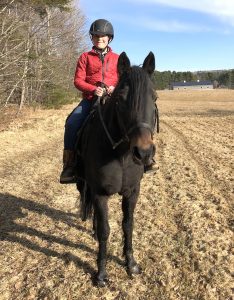
William and Roxy
I give William a riding hint each day. He may or may not remember, but he continues to improve and Roxy is responding well. We’re reading Amy Skinner’s To Catch a Horse as his non-fiction reading book.
I have a picture of Katrin Silva riding Roxy on my refrigerator, he just marvels, “How does she DO that???”
Our non-fiction reading has been from Temple Grandin and Stephen Budiansky. He is delighted with the term “anthropomorphizing” (though he struggles to pronounce it) and we talk about the horses’ reactions with respect to that often.
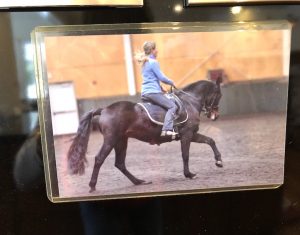
An image of Katrin Silva and Roxy on Debbie’s fridge
I rarely leave the farm, so life seems fairly normal right now, despite having a 10-year-old playmate. I am reminded every day that the horses just look at the present and are not worried by the virus. It is so calming.
Kyla Strange is a Canadian horsewoman based in New Brunswick. Owner of Khas T’an Horsemanship, she was a special guest at the 2019 BHPS. Strange accepted a new governmental position this year and made the big move from British Columbia to New Brunswick. She has had to postpone moving her horses, a development that she struggles with.
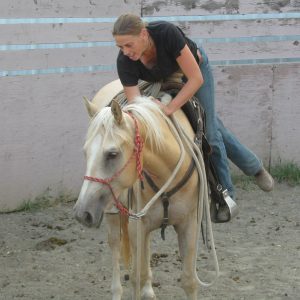
Kyla puts a first ride on a young horse
Strange writes:
It’s Day 17 of self-monitoring and team isolation, living with my elderly parents and working from home.
Theory says you cannot control certain things in life, so let go of those things and focus on what you can control. So, ok, it’s true I cannot control the spread of the pandemic or the selfishness and fear that now plagues communities across the world.
Despite re-opening Khas T’an Horsemanship recently, I can’t control my inability to teach students and ride their horses. I can’t control the fact that my three horses are still in British Columbia. It’s like an apocalyptic dream that gets worse not knowing when I will put my hands back on a horse again. It’s out of my control, but it cuts deep nonetheless.
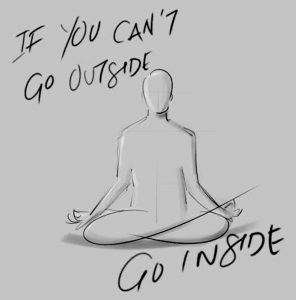
A message from Kyla
I can control limiting my exposure to the news, maintaining social distance, and my own body. I can be kind and donate money to the less fortunate. I can be mindful, explore nature alone, and chose a positive attitude. I can request horse photos from my friends and cry and give thanks when I receive them. Got it. Ok. Yes, control!
It wasn’t too long ago I spoke about Mother Earth and how she was getting angry. There were many examples: fires, floods, landslides, droughts. Our collective didn’t raise an eyebrow and well, she has now stomped her foot. Maybe the pandemic was in our control after all.
Regardless, my heart can go from light to heavy in a millisecond these days. Our four-legged friends continue to console us in these times of crisis. I struggle to accurately describe the earth bound healing they provide us.
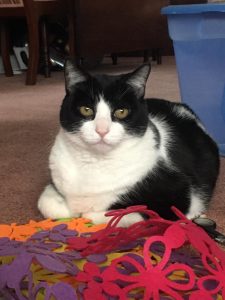
Kyla’s cat, Pika
I am grateful for my cat, Pika. He fills the voids. I gather up optimism and pray our nations have learned from this and that we will be more kind to ourselves, to each other and to Mother Earth.
Be well. Stay safe. Please Stay home. Sending Love. I am flying horseback in my dreams.
Nicole Churilla is a BHPS steering committee member and horse trainer. She wrote to me from her home in Ohio.
I live on the farm where I also work full-time. Every day I walk out of my apartment, round one corner and it’s a short walk to the main barn. We have over 100 horses and donkeys that we train and sell to a largely novice crowd of customers.
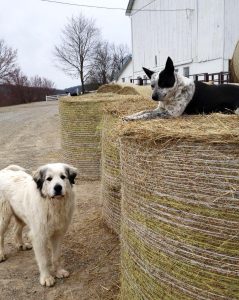
Farm dogs at Nicole’s work in Ohio
When the pandemic began, I was glued to my phone unable to pull away because of the anticipation of what would happen next. It left me feeling brain foggy and icky. So I was pleased that after one of the first days of the pandemic, I returned to the barn and realized I hadn’t had one Coronavirus thought ALL DAY LONG.
That is the power of a day of good and honest work with horses. The horses still need to be looked after and ridden, so our operation continues as normal with just a handful of employees. However, any instruction that I had scheduled with students has been canceled. We are generally not a lesson facility, but we will teach those who want to learn in a two-day intensive format (after the Stay at Home order concludes).
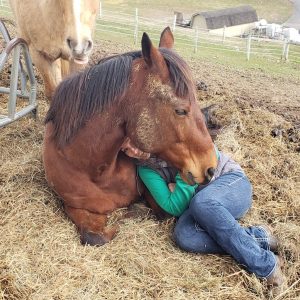
Catching a nap
I am so blessed to live on a farm where I can be around the animals daily during this pandemic.
Pictured is one of my current projects, a Friesian-Percheron mare who is brilliant!
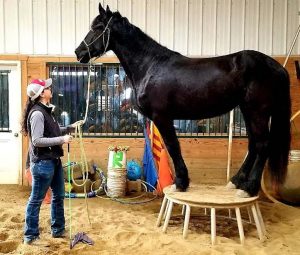
Nicole and a horse in training
Thank you. Stay safe. Keep looking for dopamine hits.
This was a great entry enjoyed it. Makes one fell that they are not alone.
Just one interesting observation, why is Kyla putting a first ride on a young horse without a helmet?
Thanks, CJ. There are many, many cowboys and cowgirls who never wear a helmet. What may be the norm in many areas, is counter-culture in others. Yes, safety is always an issue, but helmet-wearing, some maintain, is just one element of many safety steps.
Folks, I have scanned these but I am not able to be with my horse and don’t gain very much peace in reading about people who have the joy of being with theirs. Having been ill for 6 months a few years back, and alone then too, this is no more a hardship than that. And the horse is well cared for without me in these instances. Easier, this time, because I am well. The things I enjoy are lessons and books that move me toward when I can ride again.